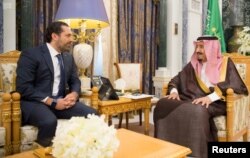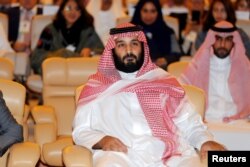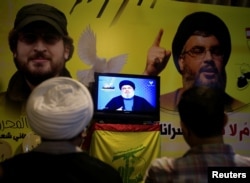Saudi Arabia's escalating rhetoric in the wake of the shocking resignation of Lebanon's Prime Minister Saad Hariri signals an escalation in the Saudi-Iranian struggle, it has been claimed.
Sunni regional power Saudi Arabia now has accused the Lebanese government of "declaring war" against it, further stoking fears of regional instability following Hariri's unexpected exit.
His departure is widely seen as imposed by his backers in the Saudi Arabian monarchy — claims the monarchy denies — in reaction to the growing influence of Shiite Iran and its Lebanese proxy Hezbollah in the region.
Dramatic move
In a dramatic move that follows a period of relative calm in Lebanon despite wider regional instability, Hariri announced his resignation while in Riyadh, driving speculation as to when and if he will return to Lebanon.
Meanwhile, on Monday, Thamer al-Sabhan, Saudi Gulf affairs minister, said Lebanon's government would "be dealt with as a government declaring war on Saudi Arabia," alleging acts of aggression by Hezbollah, which was designated a terrorist group by the U.S. and the Gulf Cooperation Council.
It signals the end of an apparent detente between Sunni and Shia political blocs within Lebanon, allowing Hezbollah ally and Maronite Christian Michel Aoun to become president a year ago — a position that had been left vacant for two years due to a political impasse.
However, with Hezbollah's powerful military wing continuing its operations in Syria — despite Lebanon's official policy of non-engagement in regional conflicts — in support of the country's leader Bashar al-Assad, who is backed by Iran, one analyst claimed the Saudis had seen little benefit from the arrangement.
"The government was perceived more as a camouflage arrangement to shield Hezbollah's activities in Lebanon and surrounding states," claimed Imad Salamey, director of the Institute for Social Justice and Conflict Resolution at the Lebanese American University.
"They [The Saudi Arabian monarchy] came to the conclusion they're better off without such a government," he added.
Turbulent period
Hariri's resignation came on a turbulent weekend in Saudi Arabia, and a turbulent period in its 85-year history.
Scores of Saudi Arabian royals, politicians and business figures were arrested in what the Saudi monarchy has claimed is an anti-corruption drive, but also is being seen as consolidation of power by Crown Prince Mohammed bin Salman.
Expected to eventually take over the Saudi throne, 32-year-old Bin Salman has quickly risen to dominate decision making, and he has promised modernizing reforms within the kingdom, including a recent end to the ban on women driving.
He is thought to play a key role in the country's ongoing struggle for power against Iran, a struggle that plays out well beyond Lebanon in regional proxies, including Syria, Iraq and Yemen.
This includes its bombing campaign in war-torn Yemen — criticized by the U.N. for causing civilian deaths, which began in 2015 — and is seen as a reaction to Iran's perceived influence over Yemen's Houthi rebels.
The charges leveled against Lebanon also were echoed Monday in rhetoric against Iran, amid Saudi claims that the Iranian supply of rockets to Yemeni militias were "direct military" aggression and an act of "war."
"The new leadership is more proactive and more aggressive," claimed Sami Nader, director of the Levant Institute for Strategic Affairs.
Nader added that the country now was able to act with backing from U.S. President Donald Trump, who repeatedly has criticized Iran and threatened to end the nuclear deal masterminded by his predecessor Barack Obama.
"The Obama policy of opening up to Iran put Saudi in a tough position, and they didn't have the capability to confront Iran with America's partnership," he said.
"That's now changed."
Caught unawares
Lebanon's leadership, most of which has held power since the country's devastating 15-year war ended in 1990 and are used to the labyrinthine complexities and political maneuvering in the country, have been caught unawares by developments.
Hezbollah leader Hassan Nasrallah adopted a conciliatory pose toward Hariri, stating that Riyadh had forced the decision and calling on him to come back to Lebanon.
Lebanese politicians used to speaking out when there are political points to be scored, however, have largely fallen silent as they adopt a wait-and-see posture, while Lebanon's president Aoun has said he will not accept Hariri's resignation until Hariri's return — a move seen by some as an effort to buy time.
But with the unity government unraveling, progress made over the last year in a country constantly buffeted by regional developments and struggling to cope with a Syrian refugee population thought to total more than 1.5 million threatens to be undone.
The country's legislative program, which has crept back into life since Aoun's election, is set to stall, while doubt has set in over elections planned for May 2018, as well as potentially lucrative efforts to tap into possible oil and gas deposits off Lebanon's coastline.
Meanwhile, the specter of sectarian strife in a nation largely split between Sunni and Shia Muslims and Christians continues to haunt Lebanon, as does the fear of economic recriminations on a country showing slow growth and depending on remittances — including from thousands of Lebanese workers in Saudi Arabia.
"This is the first shot in what will be a full blown political crisis," said Yezid Sayigh, a senior associate at the Carnegie Middle East Center in Beirut, adding that "it is the Lebanese that will suffer."
Yet despite its power, Sayigh claimed Saudi Arabia's actions in Lebanon just may backfire.
Rather than exposing Hezbollah and a weakening Iran, he said it may undermine its own influence in the country.
"They have started something they calculate is low cost to them, because if things go upside down in Lebanon it's no skin off their nose," Sayigh said. "But they've just removed their own man from being prime minister. You may find the Sunni camp [in Lebanon] divides further."







